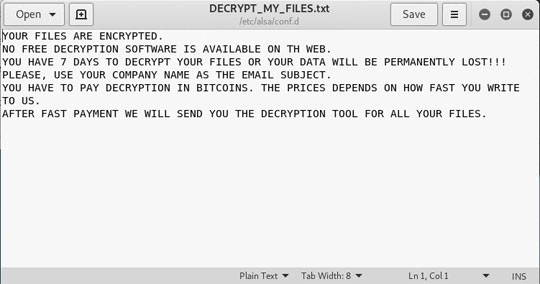Ransom.Linux.AGELOCKER.A
Trojan-Ransom.Kmdlocker(IKARUS)
Linux


Threat Type: Ransomware
Destructiveness: No
Encrypted:
In the wild: Yes
OVERVIEW
This Ransomware arrives on a system as a file dropped by other malware or as a file downloaded unknowingly by users when visiting malicious sites.
It encrypts files with specific file extensions. It encrypts files found in specific folders. It drops files as ransom note.
TECHNICAL DETAILS
Arrival Details
This Ransomware arrives on a system as a file dropped by other malware or as a file downloaded unknowingly by users when visiting malicious sites.
Installation
This Ransomware adds the following processes:
- useradd -ou 0 -g 0 -p $(openssl passwd -1 Trmw5jXYwFx)
- systemctl enable sbackup
- systemctl stop auditdtimer
Other Details
This Ransomware does the following:
- Connects to the following URL to open communication on port 1234:
- https://{BLOCKED}co{BLOCKED}yixMK
Ransomware Routine
This Ransomware encrypts files with the following extensions:
- .txt
- .xls
- .zip
- .svg
- .tar
- .php
- .png
- .rar
- .rtf
- .conf
- .docx
- .html
- .log
- .mp4
- .bmp
- .csv
- .jpg
- .doc
It encrypts files found in the following folders:
- /etc/
It appends the following extension to the file name of the encrypted files:
- .kmd
It drops the following file(s) as ransom note:
- {Encrypted Directory}\DECRYPT_MY_FILES.txt

SOLUTION
Scan your computer with your Trend Micro product to delete files detected as Ransom.Linux.AGELOCKER.A. If the detected files have already been cleaned, deleted, or quarantined by your Trend Micro product, no further step is required. You may opt to simply delete the quarantined files. Please check the following Trend Micro Support pages for more information:
Did this description help? Tell us how we did.


